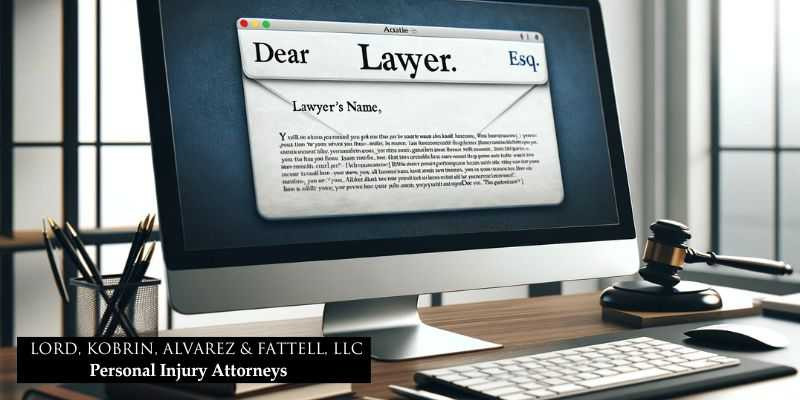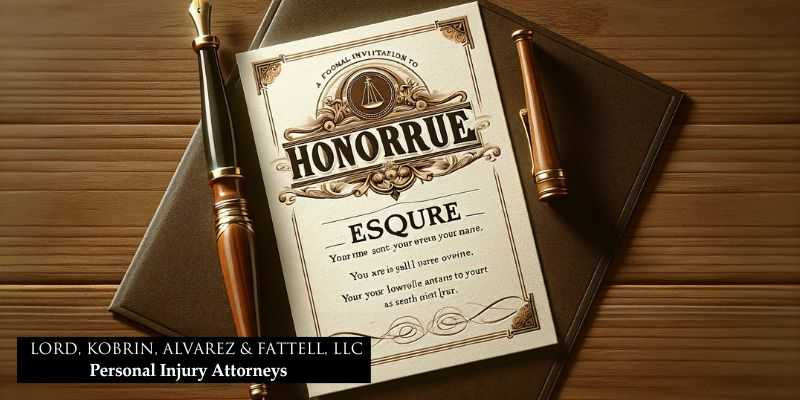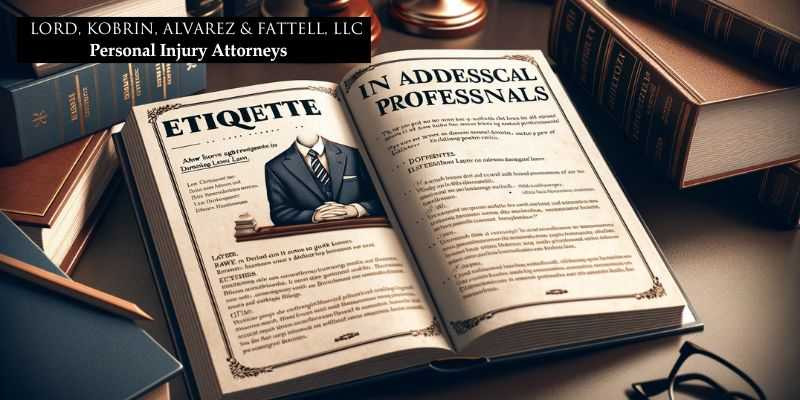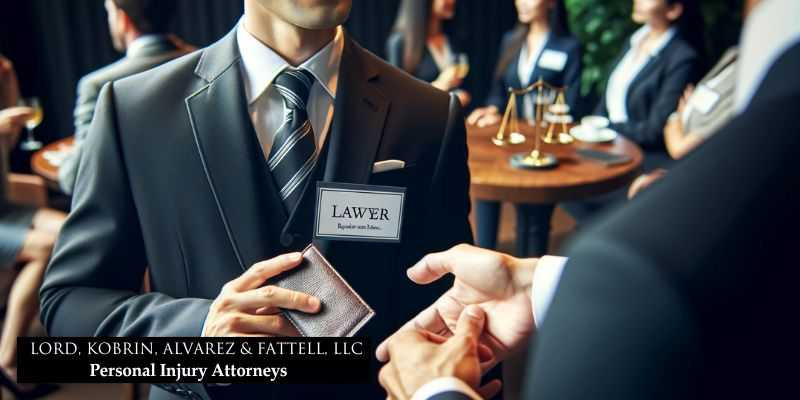Addressing a lawyer correctly is vital for establishing a respectful and productive relationship, and at internetlawyers.net, we understand its importance in legal interactions. This article provides clear guidance on how to address attorneys appropriately in various settings, whether in person, in writing, or during legal proceedings, ensuring that you navigate these interactions with confidence. Discover the professional standards, courtesy titles, and formal designations that will help you communicate effectively with legal professionals, and explore the resources at internetlawyers.net for further legal assistance and information. We will cover legal titles, decorum, and professional communication.
1. Understanding Professional Titles: Addressing Lawyers Formally
Professional titles, especially in law, necessitate formality in all communications. Addressing a lawyer, formally known as an ‘attorney at law’, demands specific etiquette, particularly in correspondence or formal settings.
Using ‘Esq.’ (Esquire), a common post-nominal suffix, is a respectful way to address an attorney. In salutations or letters, use the full name followed by ‘Esq.’ For example, address attorney Jane Doe as ‘Jane Doe, Esq.’.
However, be mindful of female attorneys’ preferences; some may prefer ‘Ms.’ before ‘Esq.’ Always use ‘Esq.’ professionally and ensure the full name precedes it. This demonstrates respect and familiarity with legal decorum.
 Email addressed to a lawyer with the subject line "Legal Consultation" and a formal greeting, emphasizing the importance of using professional titles
Email addressed to a lawyer with the subject line "Legal Consultation" and a formal greeting, emphasizing the importance of using professional titles
2. The Correct Use of ‘Esquire’: When and How to Use It
When addressing an attorney in social or informal correspondence, using ‘Esquire’ after their surname is akin to using ‘M.D’ or ‘Ph.D.’ This formal title, often on an attorney’s business card, denotes respect for passing the bar exam.
Traditionally, ‘Esquire’ is more associated with male attorneys. However, for attorneys you know well, using their first name is acceptable. Yet, start correspondence with the standard courtesy title: full name followed by ‘Esquire’ or ‘Attorney at Law’, even if they hold a J.D. or higher law degree.
Using ‘Esquire’ shows respect for professional boundaries, regardless of familiarity. Remember, internetlawyers.net can assist you in finding legal professionals who value clear and respectful communication.
 Formal invitation card addressed to a lawyer with the salutation "The Honorable Judge and Mrs. Smith", placed on a wooden table with a fountain pen, highlighting the formality of addressing legal professionals
Formal invitation card addressed to a lawyer with the salutation "The Honorable Judge and Mrs. Smith", placed on a wooden table with a fountain pen, highlighting the formality of addressing legal professionals
3. Salutations in Correspondence: Mr., Ms., and Esq.
Salutations are the foundation of professional correspondence, setting the tone and context. Standard salutations include “Mr.”, “Ms.”, and “Esq.”, the latter specifically for those in law. It’s the conventional way to address an attorney in any legal matter.
If your professional relationship is new, using a comma after “Dear Mr./Ms. [Last Name]” is suitable. When addressing a female attorney, remember that some may prefer their maiden name professionally, especially if they established their reputation before marriage. Respect this choice in legal matters.
If addressing a lawyer and their spouse, use “Ms. [Maiden Name] and Mr. [Spouse’s Last Name]”, which respects their professional identity. For further insights on legal communication, visit internetlawyers.net.
4. Professional vs. Social Address: Navigating Formal and Casual Settings
The setting significantly influences how you address a legal practitioner—professional versus social. If an attorney has multiple titles, use the one they prefer professionally, such as ‘Esquire’ or academic credentials.
In court or business correspondence, use full formal titles or initials, including when addressing an envelope to a practicing lawyer. ‘Esquire’ (Esq.) follows the full name of a licensed attorney in the U.S.
In social settings, a more relaxed tone is acceptable. If you know the attorney well, use the courtesy title Mr., Ms., or Mrs. with their surname. Asking about their preferred title is always respectful. Using a standard courtesy title recognizes their professional credentials while balancing friendliness and respect.
Turn to internetlawyers.net for advice on maintaining appropriate professional etiquette in all legal interactions.
 Book titled "Legal Etiquette: A Guide to Professional Conduct" with a gavel and scales of justice, symbolizing the importance of proper address in legal settings
Book titled "Legal Etiquette: A Guide to Professional Conduct" with a gavel and scales of justice, symbolizing the importance of proper address in legal settings
5. Addressing Female Attorneys: Navigating Titles and Names
In legal circles, the appropriate protocol for addressing female attorneys, especially those using their maiden name professionally, often arises. Adherence to professional etiquette is paramount for individuals who have graduated from law school and earned legal titles.
A common misconception is that female attorneys should be addressed differently from their male counterparts. However, regardless of gender, use the attorney’s first and last name in professional communication to underscore mutual respect and decorum.
When mailing a letter or official correspondence, write the attorney’s full name. Some female attorneys use their spouse’s name socially but list their maiden name professionally. Titles like “Esquire” (Esq.) follow the attorney’s name, which is not only a sign of respect but also proper protocol in legal and formal communications. Some may prefer academic credentials like ‘JD’ or ‘LLB’ after their name.
Context and personal preference are critical when addressing titles and names professionally. At internetlawyers.net, we promote respectful and accurate communication in all legal contexts.
6. ‘Attorney at Law’ and Other Formal Designations
The designation ‘Attorney at Law’ traditionally indicates an individual licensed to practice law. This title signifies rigorous education, testing, and the privileges and responsibilities of passing the state bar exam, equipping them to provide professional legal aid.
However, some attorneys prefer recognition by their first and last names without formal designations. Addressing an attorney according to their preference acknowledges their style and an ongoing professional relationship.
In professional settings, especially if the spouse is a doctor, respect the spouse’s title similarly. Socially, address the couple as ‘Dr. and Mr./Ms./Mrs.’ if their spouse is a doctor. Different countries may have different customs for addressing professionals and their spouses.
In a formal letter, avoid salutations like ‘Dear Mr.’; instead, use ‘Esq.’ or ‘Attorney’ before the receiver’s name. Align formality with the order of professional designations to show honor and respect. Maintaining appropriate title protocol recognizes individuals’ professional achievements. For more information, consult internetlawyers.net.
 Person and lawyer exchanging business cards at a networking event, highlighting the importance of respectful address in a social setting
Person and lawyer exchanging business cards at a networking event, highlighting the importance of respectful address in a social setting
7. Academic Credentials and Legal Titles: JD and Beyond
In academic credentials, the Juris Doctor (JD) represents a significant legal achievement. This degree typically means a person has completed three years of law school and is qualified to practice law.
However, unlike doctors or Ph.D. holders, using the academic title for individuals with a JD is not common in social situations, a well-recognized norm in the legal profession.
When addressing these individuals, accurately order their names and titles. Professionally, ‘Esquire’ (Esq.) is appended after their full name as a sign of respect. Socially, ‘Mr.’ or ‘Ms.’ is common before their names. Usage depends on the circumstance, underscoring the values inherent in professional and social contexts.
Using these titles appropriately respects their years of education. Turn to internetlawyers.net for guidance on understanding and respecting legal titles and credentials.
8. The Importance of Context and Personal Preference
Context and personal preference significantly influence how to address a lawyer correctly. While general guidelines exist, such as using “Esq.” in formal legal correspondence, being aware of individual preferences is crucial.
For instance, some attorneys may prefer to be addressed by their first name in less formal settings, while others may prefer the continued use of their formal titles. Asking an attorney about their preferred form of address demonstrates respect and professionalism.
Consider the setting: a courtroom demands more formality than a casual meeting. Tailoring your approach to the specific situation and the individual’s preference ensures respectful and effective communication. Internetlawyers.net emphasizes the importance of these nuances in fostering positive attorney-client relationships.
9. Common Mistakes to Avoid When Addressing a Lawyer
Several common mistakes should be avoided when addressing a lawyer to maintain a respectful and professional relationship. One frequent error is assuming gender-specific titles. Always confirm an individual’s preferred title, as assumptions can be disrespectful.
Another mistake is using informal language or nicknames in formal legal settings. Stick to professional titles and surnames unless explicitly invited to use a first name basis. Additionally, avoid omitting titles altogether in written correspondence, as this can come across as dismissive.
Using incorrect abbreviations or misspelling names are also common errors that can undermine your credibility. Always double-check the spelling of names and titles before sending any communication. Internetlawyers.net provides resources to help ensure your communications are accurate and respectful.
10. How to Address a Judge vs. a Lawyer
Addressing a judge differs significantly from addressing a lawyer, reflecting the distinct roles they hold within the legal system. Judges are typically addressed with more formality and respect due to their position of authority in the courtroom.
In court, judges are commonly addressed as “Your Honor” or “Judge [Last Name]”. In written correspondence, use “The Honorable [Full Name]” on the envelope and “Dear Judge [Last Name]” in the salutation. These protocols emphasize the respect due to the judicial office.
Lawyers, on the other hand, are generally addressed as “Mr./Ms./[Last Name]” or, in formal legal documents, as “[Full Name], Esq.” The key difference is the level of formality, with judges receiving the highest level of respect in legal settings.
Understanding these distinctions is essential for anyone interacting with the legal system. Internetlawyers.net offers further guidance on navigating these professional relationships with respect and decorum.
11. Addressing Legal Professionals in Different Countries
Addressing legal professionals varies significantly across different countries, reflecting diverse cultural and legal traditions. For instance, in the United Kingdom, barristers are often addressed as “Mr./Ms./[Last Name]” in court, while solicitors are typically addressed as “Esquire” in written correspondence. Judges are addressed as “Your Honour” or “My Lord/Lady” depending on their rank.
In civil law countries like France, lawyers are often addressed as “Maître [Last Name]” regardless of gender. Judges are addressed with even greater formality, often using titles that reflect their specific judicial role.
Understanding these international differences is crucial for legal professionals and anyone conducting business across borders. Internetlawyers.net provides resources to help navigate these cultural nuances and ensure respectful communication with legal professionals worldwide.
12. Resources for Further Guidance on Legal Etiquette
Numerous resources offer further guidance on legal etiquette, helping ensure respectful and effective communication within the legal profession. Legal organizations like the American Bar Association (ABA) provide guidelines on professional conduct, including proper forms of address.
Law schools often include courses or workshops on legal etiquette as part of their curriculum, preparing students for professional interactions. Online resources, such as legal blogs and forums, also offer practical advice on addressing legal professionals in various settings.
Books on legal writing and communication often include sections on etiquette, providing detailed instructions on proper titles and salutations. Internetlawyers.net curates a selection of these resources to support your professional development and ensure you communicate with confidence and respect.
13. Case Studies: Examples of Correct and Incorrect Addressing
Examining case studies of correct and incorrect addressing can provide practical insights into legal etiquette.
Case Study 1: Correct Addressing
A paralegal sends a formal letter to an attorney, addressing it to “Jane Doe, Esq.” The salutation reads, “Dear Ms. Doe.” This demonstrates both respect for the attorney’s professional status and attention to her preferred title.
Case Study 2: Incorrect Addressing
A client emails their lawyer, starting with “Hey John!” While informality may be acceptable in some contexts, it is generally inappropriate for initial or formal communications. A more suitable greeting would be “Dear Mr. Smith.”
Case Study 3: International Context
An American lawyer corresponds with a French attorney, addressing them as “Maître Dubois.” This shows an understanding of French legal customs and demonstrates cultural sensitivity.
These examples illustrate the importance of context, personal preference, and cultural awareness in addressing legal professionals correctly. For more insights and guidance, turn to internetlawyers.net.
14. Staying Updated on Changes in Legal Protocol
Staying updated on changes in legal protocol is essential for maintaining professional and respectful communication within the legal field. Legal etiquette is not static; it evolves with societal norms and professional standards.
Subscribing to legal newsletters and journals can provide updates on changes in professional conduct guidelines. Attending legal conferences and workshops offers opportunities to learn from experts and peers about current best practices.
Networking with other legal professionals can also provide valuable insights into evolving etiquette norms. Internetlawyers.net is committed to providing the latest information on legal protocol, ensuring you stay informed and communicate effectively.
15. FAQs: Addressing Lawyers – Common Questions Answered
Here are some frequently asked questions about addressing lawyers, designed to provide clear and concise answers to common queries:
15.1. How do I address a lawyer in an email?
Use “Dear Mr./Ms./[Last Name]” or “Dear [Full Name], Esq.” for a formal approach.
15.2. Is it okay to use first names?
Only if you have an established, informal relationship. Otherwise, stick to formal titles.
15.3. How do I address a judge in court?
Use “Your Honor” or “Judge [Last Name]”.
15.4. What if I don’t know the lawyer’s gender?
Use “[Full Name], Esq.” to avoid making assumptions.
15.5. How do I address a female attorney who uses her maiden name?
Use “Ms. [Maiden Name]” professionally.
15.6. Should I use “Esquire” in verbal communication?
No, “Esquire” is typically used in written correspondence.
15.7. How do I address a lawyer with a Ph.D.?
In legal contexts, prioritize their legal title (Esq.).
15.8. What if the lawyer is also a professor?
Use their legal title in legal settings and “Professor [Last Name]” in academic settings.
15.9. How important is it to get the address correct?
Very important. It demonstrates respect and professionalism.
15.10. Where can I find more information on legal etiquette?
Internetlawyers.net provides comprehensive resources on legal etiquette and professional conduct.
Conclusion
Knowing how to address a lawyer correctly is fundamental to fostering respectful and effective communication in legal settings. Whether in person, in writing, or during formal proceedings, adhering to established protocols demonstrates professionalism and respect for the legal profession. Remember to consider context, personal preference, and cultural nuances when addressing legal professionals. At internetlawyers.net, we are committed to providing the resources and guidance you need to navigate these interactions with confidence.
For further assistance and to connect with experienced legal professionals, visit internetlawyers.net today. Our platform offers comprehensive information, resources, and connections to help you confidently navigate the legal landscape. Don’t hesitate to explore our website and reach out to our network of qualified attorneys for expert guidance and support.
Address: 111 Broadway, New York, NY 10006, United States
Phone: +1 (212) 555-1212
Website: internetlawyers.net

